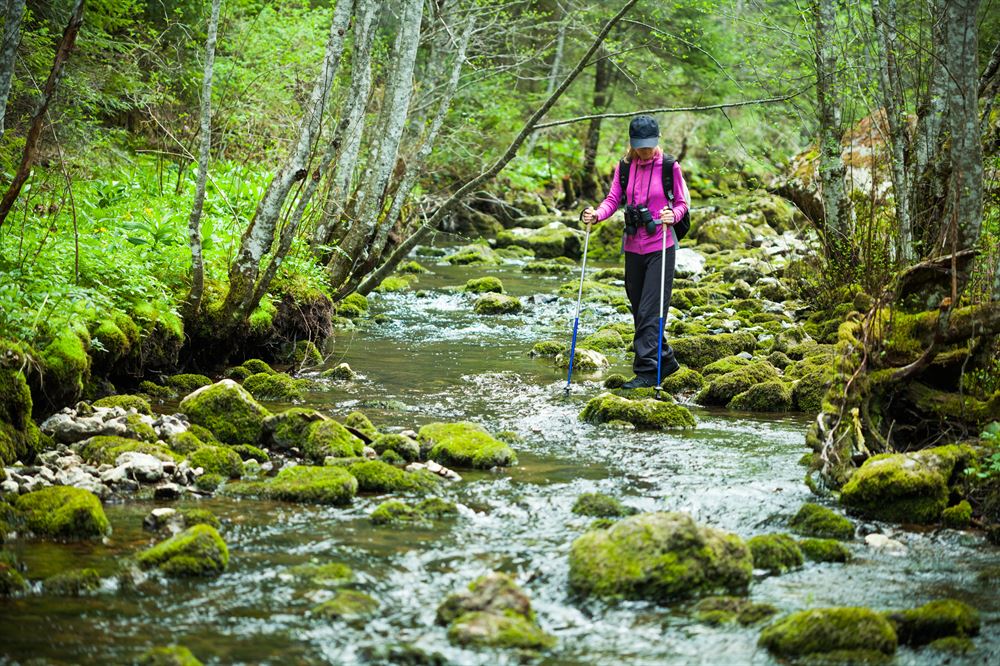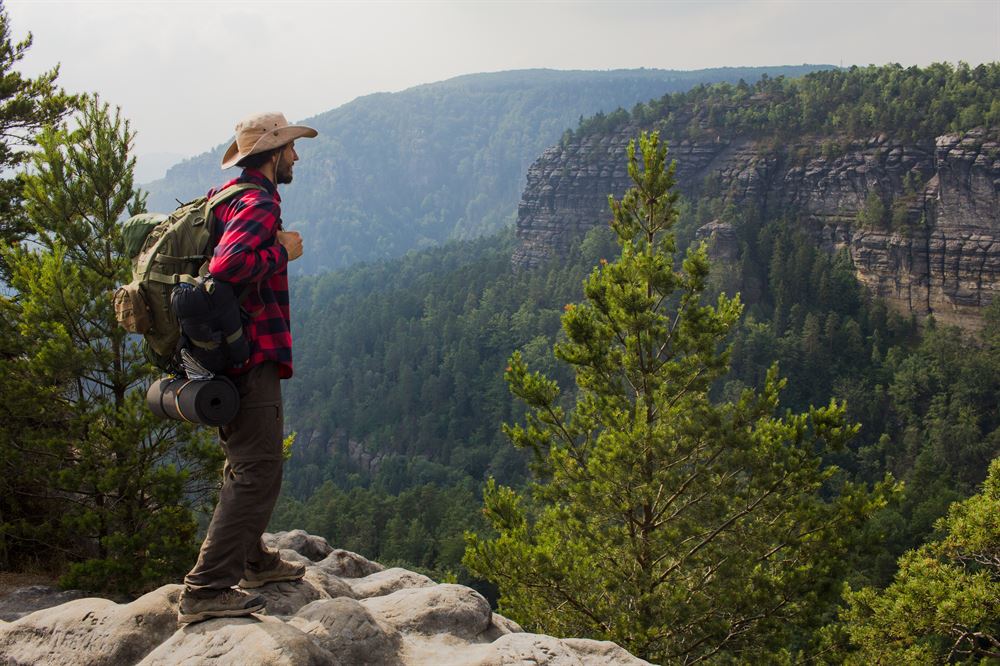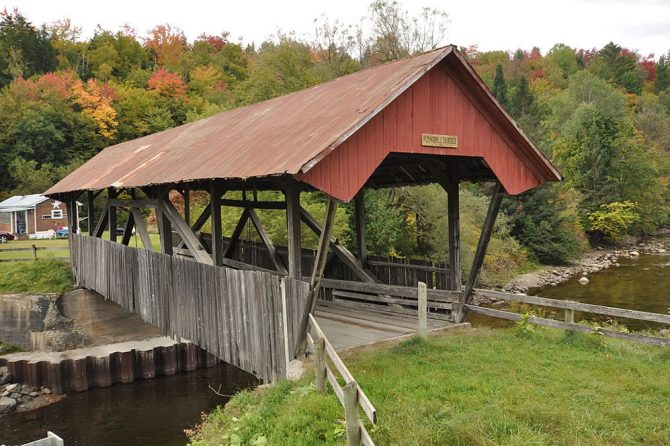Imagine stepping onto a path weaving through green forests, over hills, and by calm streams. This is your chance to walk the Appalachian Trail in Vermont. Here, it joins the Long Trail for a memorable 105-mile trek. This journey, cared for by the Green Mountain Club, isn’t just hiking. It’s a true Vermont adventure, blending beauty, challenge, and friendship found on long trails. Yup, it's a great way to enjoy the warmer seasons in Vermont, so read on!
Whether you’re an experienced hiker or new to trekking, the Green Mountain Club makes your Appalachian Trail journey in Vermont amazing. Answer the wild’s call and enjoy the trail community as you walk a piece of America’s famed hiking trail. Great for the lungs, clearing out brain fog and just plain doing something different.
Important points and key takeaways
- Discover the unique overlap of the Appalachian Trail and Long Trail in Vermont, maintained by the Green Mountain Club.
- Embark on a Vermont adventure that promises both enchanting scenery and diverse terrains.
- Experience the sense of community among hikers on the Appalachian Trail in Vermont.
- Trust the Green Mountain Club to guide you through one of the country’s most storied outdoor experiences.
- Gain insights into the preparation necessary to tackle this distinctive section of the Appalachian Trail.
Why Vermont’s Section of the Appalachian Trail is a Must-Experience for Hikers
Walk through Vermont’s vibrant scenery on the Appalachian Trail Vermont section. This part is more than a path; it’s a journey across stunning landscapes. It offers a fulfilling hiking experience in the Northeast.
Discovering the unique charm of the Vermont Appalachian Trail
The Vermont Appalachian Trail is special. It winds through dense forests, across meadows, and past calm mountain streams. This blend of nature and quiet allure attracts hikers worldwide.

How the trail offers a mix of scenic vistas and challenging terrains
If you love beautiful views or enjoy tough trails, Vermont’s part of the Appalachian Trail delivers. You’ll climb mountains like Stratton and Bromley for amazing views. Every step brings a new view, a fresh test, and more love for Vermont’s wild places.
Exploring the relationship between the Appalachian Trail and the Long Trail in Vermont
The Appalachian Trail meets the Long Trail in a historic spot. As you walk this shared part, you’re joining a long line of hikers. This stretch, maintained by the Green Mountain Club, mixes past tales with today’s dreams. It offers a hiking story that’s uniquely Vermont.
Planning Your Hike: Essential Tips and Guides for the Vermont Appalachian Trail
Heading out on the Vermont Appalachian Trail is exciting but needs careful planning. Whether you enjoy short, peaceful hikes or longer adventures through the Green Mountains, a good plan is essential. This guide offers tips on picking starting points, understanding the trail, and getting ready for the weather. This ensures a safe and unforgettable journey.
Finding the best trailheads for day hikes and long-distance treks
Choosing the right starting point is key for your Vermont hike. For shorter hikes, consider the following:
- The Vermont Institute of Natural Science in Quechee offers hands-on exploration and learning opportunities, including nature trails to immerse yourself in the fall foliage. Quechee Gorge State Park has a short and easy hike from the visitor's center down to the bottom of the dramatic Vermont's deepest gorge.
- Thundering Brook Falls near Killington is a very easy 0.4-mile out-and-back hike to a powerful 125-foot waterfall.
- Warren Falls in Warren is also a short, scenic hike with a beautiful waterfall.
Look into different starting points, considering distance, elevation, and the views you want to see. Many sources highlight that Vermont has a wealth of short, scenic hikes that are perfect for families or those new to hiking in the state's beautiful forested landscape. The key is choosing hikes that match your fitness level and interests.
Finding your way in the Green Mountains can be exciting, but tricky. Always use official maps and guides, like those from the Green Mountain Club. They detail the trail and are must-haves for all hikers. Also, use GPS apps, but have paper maps too, as electronics can fail. Advice from local shops and past hikers is also very helpful.
What to know about trail conditions and preparing for Vermont’s weather

The trail’s condition changes with the seasons. Knowing about closures, weather damage, or maintenance ahead of time is important. Being ready for Vermont’s weather is crucial, as it can change quickly. Pack for cold, heat, rain, or snow, depending on your hike time. Regularly check the weather before your trip for the latest updates.
The Role of the Green Mountain Club and the Appalachian Trail Conservancy in Vermont
In Vermont, the Green Mountain Club and the Appalachian Trail Conservancy play a big part in caring for hiking trails. They protect Vermont’s outdoors; They show how we can help keep trails in good shape and make them better.
Contributions of the Green Mountain Club to Vermont’s hiking trails
The Green Mountain Club is key in looking after the Long Trail and parts of the Appalachian Trail in Vermont. It focuses on taking care of the trail, teaching hikers how to be mindful, and protecting nature. Their hard work and teaching help ensure Vermont’s trails are fun and open to everyone.
How the Appalachian Trail Conservancy supports the trail in Vermont and beyond
The Appalachian Trail Conservancy expands its help beyond Vermont, covering the whole Appalachian Trail. They work to protect the area around the trail, keeping it wild. Their efforts also include research, working with volunteers, and programs to keep the trail ready for future hikers. This helps make it a top place for hiking.
Learn more and become a member today: Joining the efforts to maintain the trail
Getting involved can have a big impact. Join the Green Mountain Club or the Appalachian Trail Conservancy to help. Your support aids in trail care, conservation, and strengthens the hiking community. Being a member makes you proud and connects you to these natural wonders. You also get to learn and grow through their programs and activities.
Become an integral part of Vermont’s hiking legacy—play a role, make contributions, provide support, and help maintain the verdant trails that countless adventurers cherish.
Must-See Highlights Along the Vermont Appalachian Trail

Get ready for an amazing trip on the Vermont Appalachian Trail. Every step brings you closer to New England’s wild beauty. We’ll guide you to the best spots and hidden gems along the way.
Experiencing Vermont’s foliage through the Appalachian Trail
The Vermont Appalachian Trail is the best spot to see stunning foliage. Reds, oranges, and yellows light up the sky in autumn. This wonder attracts people worldwide, and you can experience it firsthand.
From Killington to the New Hampshire border: Notable landmarks and shelters
There are numerous sights and shelters along the journey from Killington to the New Hampshire border. Keep an eye out for Pico Camp’s stone cabin and the peaceful Thistle Hill Shelter. They offer great rest spots in beautiful settings.
The scenic beauty of crossing the Connecticut River and the Green Mountains
The Connecticut River crossing offers stunning views of nature blending with the sky. The Green Mountains welcome you next with their beauty and challenges. Your walk through Vermont’s wilderness will create unforgettable memories.
Connecting with Nature and Community: The Appalachian Trail in Vermont

When you start your hike on the Vermont Appalachian Trail, it’s more than just a stroll. You step into a community as vibrant as the surrounding nature around you. Here, every walk is a journey of bonding and creating memories. Each step on this lush trail brings hikers closer, turning moments into lifetime memories and long-lasting friendships.
The lifetime memories and friendships built on the Vermont Appalachian Trail
It’s not just the trails and mountains that make the experience. It’s the laughter, the stories shared, and the encouragement given. These personal touches shape the journey. For anyone setting foot here, whether local or visitor, the Vermont woods become a place to connect. They nurture friendships as enduring as the mountains.
How the trail plays a larger part in the life of Vermonters and hikers alike
For Vermonters, this trail captures the essence of their lush state. It’s about bonding with nature and appreciating the beauty they call home. For hikers from afar, this trail symbolizes belonging to something grand. It’s a mix of perseverance, discovery, and joy in the wilderness. The Appalachian Trail in Vermont stands as a beacon of unity, a vital part of this community‘s spirit.
The cultural significance of the trail coinciding with the Long Trail
Exploring Vermont’s backcountry is enriching. When you walk paths full of natural beauty, you also find deep cultural significance. The Appalachian Trail meeting the Long Trail is not just by chance. It’s a point where history meets, weaving tales into Vermont’s culture.
The Long Trail is the oldest long-distance trail in the U.S. It holds a special place for Vermonters and hikers. As you walk this path, you’re tracing routes made by early conservationists. They created these paths by hand, wanting to save Vermont’s beautiful landscapes. Here, the concept of recreational hiking took root in America.
Let’s see how the Long Trail enriched Vermont’s natural beauty with its culture:
| Element of Cultural Significance | Impact on Trail Experience |
|---|---|
| Vermont’s Hiking Tradition | Experiencing shared love for conservation and the outdoors, which defines Vermont. |
| Historical Shelters and Lodges | Staying in places that have welcomed hikers for ages, giving a peek into the past. |
| Conservation Efforts | Seeing and helping with projects that protect the trail for future generations. |
| Legacy of Trailblazers | Following the paths of early explorers and conservationists who made these trails. |
| Community Bonding | Meeting hikers and locals who love these trails, sharing a common goal and history. |
The cultural significance of these trails shines because of their history and being together. Stepping on the Long Trail means joining a legacy. You become part of a big family of hikers, nature lovers, and conservationists. This journey isn’t just a walk in the woods. It’s a key part of American hiking culture and history. You continue the story with each step.
- Honor the trail pioneers and enjoy the outdoors just as they wanted.
- Discover landscapes that have moved artists and dreamers for years.
- Share stories with other hikers, connecting with the community’s spirit.
In witnessing the Appalachian Trail and the Long Trail together, you’re part of a living story. By recognizing the cultural significance of your hike, it becomes more than just exercise. It becomes a deep, personal chapter in Vermont’s vast story.
Setting out on the Vermont Appalachian Trail brings you face-to-face with nature’s beauty. From amazing views to calm forests. Yet, it’s essential to approach the unpredictable and often rugged terrains with care. With the right prep, you can enjoy the journey and stay safe. We’ll explore important safety tips, cover the typical common challenges hikers face, and point you to key resources and organizations ready to help.

It doesn’t matter if you’re experienced or new to hiking, knowing the best safety tips is key on the Vermont Appalachian Trail. Good shoes are vital for rocky trails, and layers help with weather changes. Don’t overlook a well-stocked supply kit. This should have a first aid pack, plenty of water, a map or GPS, and food for emergencies.
Addressing Common Challenges Faced by Hikers on the Appalachian Trail in Vermont
- Weather Uncertainties: Be ready for quick shifts in weather, including rain or snow, even in summer.
- Wildlife Encounters: Learn to live safely with local animals. Stay away from them, and store your food properly to not draw them near.
- Terrain Navigation: Hilly and rocky areas can be hard, so make sure you’re fit and know how to handle these parts.
- Isolation: Solitude has its perks, but always tell someone your hike plans and when you plan to return.
Knowing how to handle these navigating challenges improves your trail safety greatly.
Resources and Organizations Dedicated to Trail Safety and Hiker Support
Many resources and organizations are out there for hikers needing help and info. The Green Mountain Club and Appalachian Trail Conservancy are great support resources. They help keep the trail going and teach about hiking safely. Here’s a quick list of what they offer:
| Resource/Organization | Services Provided | Contact Information |
|---|---|---|
| Green Mountain Club | Trail maintenance, education programs, and hiker services | On the official Green Mountain Club website |
| Appalachian Trail Conservancy | Conservation, workshops, and trail news | Contact through the ATC’s official site or local chapter |
| Local Ranger Stations | Latest trail conditions, alerts, and permits | At key entry points along the trail |
| Emergency Services | Search and rescue, medical help, safety advice | 911 for emergencies or local non-emergency numbers |
Using these resources and connecting with organizations will boost your knowledge and ensure safety on the Vermont Appalachian Trail. The right prep and understanding can turn potential navigating challenges into unforgettable parts of your adventure.
FAQ's
Q: What scenic views can I expect while hiking the Appalachian Trail in Vermont?
A: Vermont's rugged section of the Appalachian Trail (AT) promises some of the most breathtaking scenic views in the Green Mountain State, especially as the trail winds through the Green Mountain National Forest. Expect panoramic vistas of both the Vermont mountains and the distant peaks of the White Mountains in NH. Highlights include the view from Stratton Mountain, which overlooks a vast expanse of forest, and the serene beauty of Little Rock Pond. Each step offers a new perspective of Vermont's natural beauty, making every moment on the trail memorable.
Q: How can I find the best trailheads for starting my hike on the AT in VT?
A: Vermont boasts numerous trailheads to access the Appalachian Trail, providing various options for hikers of all levels. Key trailheads include those at the Massachusetts border, off Vermont Route 9 in Woodford, and further north at Dartmouth in Norwich, among others. The Green Mountain Club's website provides comprehensive driving directions and maps. For a popular day trip, the trailhead near Pomfret on VT Route 12 offers convenient access to the scenic heights of the Green Mountains. Remember, each trailhead offers a unique gateway to the AT's natural wonders in Vermont.
Q: Can the Green Mountain Club (GMC) help me plan my Appalachian Trail hike in VT?
A: Absolutely! The Green Mountain Club (GMC) is instrumental in helping both seasoned hikers and newcomers to make the Vermont mountains play a larger part in their lives. The GMC, dedicated volunteers who also maintain much of the AT in Vermont, provides detailed maps, expert advice, and organized outings. Their assistance in our visitor's preparation can be invaluable, offering insights into trail conditions, necessary permits, and the best times to hike. For anyone looking to explore the AT in Vermont, the GMC is an essential resource.
Q: Do I need to be concerned about mud season on the Appalachian Trail in VT?
A: Yes, mud season is a significant consideration for hikers in Vermont, typically occurring from late spring into early summer. During this time, melting snow and frequent rains can make trails muddy, slippery, and more challenging to navigate. The Green Mountain Club (GMC) and the Appalachian Trail Conservancy often advise hikers to avoid certain sections of the trail during mud season to prevent trail erosion and damage to the surrounding flora. It's always best to check current trail conditions and recommendations from these organizations before setting out on your hike.
Q: How long is the Appalachian Trail section that runs through Vermont?
A: The Appalachian Trail in Vermont spans approximately 100 miles from the Massachusetts border in the south to the Maine Junction near Norwich, where it coincides with the Long Trail for about 100 miles north. This section of the trail offers a unique experience that includes crossing through both the Green Mountain National Forest and private lands, providing a diverse hiking experience that ranges from serene forests to challenging ridgelines.
Q: What type of wildlife might I encounter while hiking the AT in Vermont?
A: Vermont's section of the Appalachian Trail, running through the verdant forests of the Green Mountain National Forest, is home to an array of wildlife. Hikers might spot white-tailed deer, moose, black bears, and a variety of bird species, including the majestic pileated woodpecker and the elusive barred owl. Smaller creatures such as beavers, foxes, and an assortment of amphibians also inhabit these woods. While encounters with such wildlife can be thrilling, it's crucial to respect their habitat by maintaining a safe distance and following Leave No Trace principles.
Q: How does the AT Conservancy contribute to the hiking experience in Vermont?
A: The Appalachian Trail Conservancy (ATC) plays a crucial role in preserving, managing, and advocating for the Appalachian Trail, ensuring that the trail system offers a premier hiking experience. In Vermont, the ATC collaborates closely with the Green Mountain Club (GMC) and other local organizations to maintain the trail, protect its natural beauty, and provide hikers with up-to-date information. Their efforts include trail maintenance, habitat protection, and educational programs designed to foster a deeper appreciation for the wilderness and the importance of conservation. Hikers can rely on the ATC for resources and support to enhance their journey on the AT in Vermont.
Q: Are there any historic or cultural sites along the AT in Vermont?
A: Yes, the Appalachian Trail in Vermont runs past several historic and cultural landmarks that offer hikers unique glimpses into the region's past and its present-day life. One notable site is the Calvin Coolidge State Historic Site in Plymouth Notch near the trail, which offers a peek into the life of the 30th President of the United States. Also, as the trail approaches the Green Mountains, hikers will pass through small towns and communities that reflect the enduring spirit and heritage of Vermont. These places, often just a short detour from the trail, enrich the hiking experience with stories and sights that capture the heart of the Green Mountain State.
Conclusion
We have come to the end of our article’s journey. We looked at the stunning beauty and challenges of Vermont’s Appalachian Trail. It offers rugged terrains for the adventurous and serene views that reward your efforts. This trail is nature’s masterpiece and shows the hard work of groups like the Green Mountain Club. Ready for your Vermont adventure? Each part of the trail has fresh stories and memories for you.
The Green Mountain Club and the Appalachian Trail Conservancy work together to protect and connect. The trail is more than a path. It’s a bridge to nature and between people. Now, it’s your chance to join the long story of the Appalachian Trail in Vermont.
As you start your Vermont adventure, take this knowledge and enthusiasm with you. We encourage you to explore. Vermont’s trails are not just beautiful. They make the journey joyful. Let your adventurous spirit free and the Green Mountain Club lead you to discover unknown places.
Thank you for reading this post, don't forget to subscribe to our email list for the latest news!















